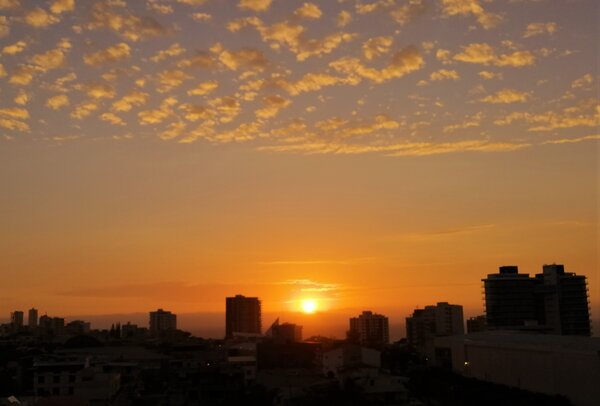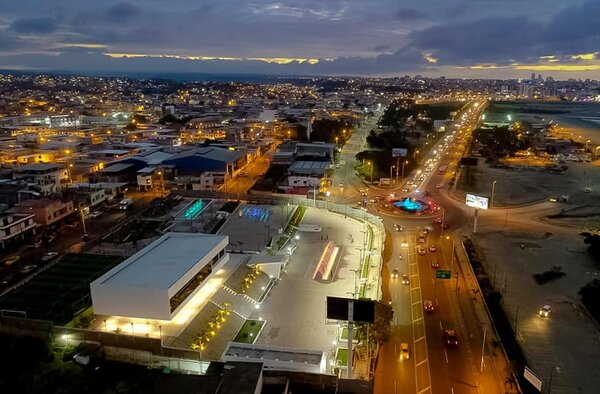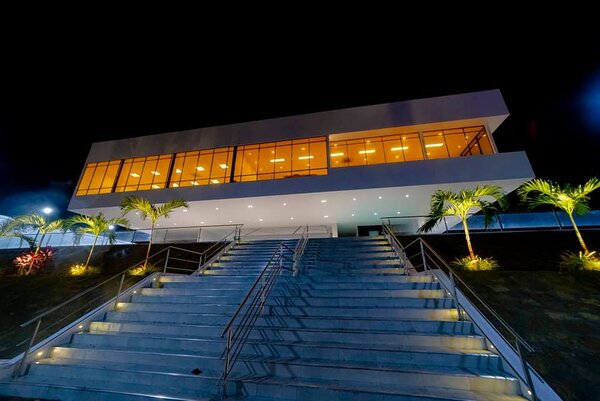By IL‘s Ecuador Insider, Donna Stiteler, and Guest Contributor, Mark Bradbury
Manta—Making Improvements and Coping With COVID
By Mark Bradbury
Manta, my home for the past two years, is one of the fastest growing cities in the country… It’s developing quicker than any other Ecuadorian city on the shores of the Pacific. This is thanks in part to Manta having one of the youngest and most progressive mayors of any large city nationwide. He and his staff have been pushing Manta to the front of every line.
The mayor and his Emergency Committee have made hard decisions throughout the quarantine period, choosing to look at the big picture over the long haul, and not becoming obsessed with reopening everything prematurely. Most of the expats who live here are in agreement with these decisions, and feel safer because of them.
Is it safe to be here during the pandemic? Everyone thinking of coming to our great oceanfront city wants to know the answer to that question, and my response is that if you follow the biosecurity protocols, then your risks are probably lower than in most cities in the U.S., and many others throughout the world. Only a small percentage of our 300,000-strong population has become infected.
I personally feel very comfortable going out in Manta to shop or dine. You’ll need to wear a mask at all times. You may be asked to go through a disinfection tunnel, or be sprayed with an alcohol or mild bleach solution. These things are now part of everyday life here. By following the local protocols, you’ll be able to move about freely, enjoying all that Manta offers.

Our beaches were prepared to reopen in July, but that date was postponed, and was put off a second time. Three of the largest in our canton finally reopened last week, with cameras in place and onsite security to make sure protocols are followed. There are 12 beaches within the canton (county) of Manta, and each one has benefitted from the lack of people using them over the past few months. They returned to a dazzling natural state!
What’s new in Manta? The city is continuing to develop—and provide new reasons to visit or move here—even in unprecedented times. There are over 50 city projects ongoing. Our Malecón, the beach road, is undergoing extensive reconstruction for smoother access and travel. Palm trees have been planted along the waterfront, and in other key locations. Our city parks and recreational areas everywhere have been cleaned up and improved. The new Plaza del Mar set to open soon has a maritime museum, and soccer and playground facilities for kids. Plaza del Mar looks amazing—I’m anxious to visit!

There are two major waterfront projects underway that will change the face of Manta. The Port of Manta is the second largest port in Ecuador, with better deep water access than anywhere else. It’s home to the largest commercial fishing fleet in the country. Those ships sail for albacore tuna—making Manta the second largest tuna exporter in the world. Work is currently being done to improve the facilities for every commercial fishing vessel in the harbor.
The second project is a large and beautiful waterfront park that’s being built on a huge vacant lot along the east end of the Malecón. The designs are exciting! It’s expected to be complete in about two years, and will truly make Manta a better place for all of us. It will be the new centerpiece of the waterfront, and a major draw.
Here are a few others things happening that will make Manta a more desirable place to live and visit. Our airport is being rebuilt. With luck that should be completed by the end of 2020. There is word that at least one airline wants to fly international flights in and out of Manta when it’s finished, opening up doors to the world from here.
We have a world-class mall that is only three years old; a new cruise terminal to welcome the cruise ships that make Manta a port of call; and new buildings going up in several locations along the oceanfront. Our Scenic Malecón at Murcielago Beach has fully reopened, with 22 restaurants offering a wide variety of some of the best seafood on the coast. There is no scarcity of good food here in Manta—our province of Manabi is famous throughout the country for its outstanding “Manabita” cuisine. (Manabita food encompasses just about every different type of seafood, chicken, pork, beef, and some goat dishes. It’s simply delicious and hard to describe.)
Manta and its people are ready to welcome you and yours to our beautiful city! Come to our city by the sea and find out why so many expats love living here…
I Have Two Homes…and I Miss Each One Differently
By Donna Stiteler
I stepped off the plane in St. Petersburg, Florida…and was hit by a wave of explosive heat that left me screeching, “I’m melting! I’m melting!” I instantly missed mild Cuenca.
Don’t get me wrong. I love Florida. I need to return to my home state at least twice a year, so my older sisters can torment me for a bit, like old times. So I can watch my nephews turn into men. So I can sit around the table at Christmas, the way things always were, downing wine and eating crispy fried turkey.
I need the rituals. Like sitting in the living room with my dad, telling him “I love you”—and hearing his familiar unintelligible grunt in response, as he gives a wave of his hand, which is his way of saying “I love you.”
When I’m not in the States, I miss my friends, most of whom I’ve had since junior high… They’re the kind of friends you can lose touch with for years then pick up where you left off without missing a beat.
There are lots of things I miss about the U.S. when I’m in Ecuador. Just as, there are lots of things about Ecuador that I miss when I’m back in the U.S.
I’ve changed since moving to Cuenca. When I first came to Ecuador, I had just quit a stressful job where I was on call 24/7. I comforted myself with greasy KFC chicken, drank wine to ease my pain, watched reality shows to escape, and took Ambien to sleep. That was my life in the U.S. Every day. I squandered time that should have been spent with family and friends. Instead, I nursed hangovers and sheltered myself in my bedroom reading useless magazines. I rode my bike a bit to pretend I was healthy. But it was usually to the store down the street to pick up a Snickers bar.
How did I let my life get so out of control? I needed a drastic push off the cliff to free fall into another life. International Living was that push. I began reading about retiring overseas. And each day I still went to work, following my uninspired routine. Until one day I realized, I didn’t have to live like this. And probably would live a much shorter life if I did continue to live like this. The next day I quit my job. Two months, four suitcases, and five dogs later, I was on a plane to Cuenca.
I remember telling my mom I was moving to Ecuador, and she asked me to take a picture of her in case I never saw her again. My dad asked if Ecuador was on Mars. My sisters were a bit mad… We’re clannish—no one moves. But I knew if I didn’t make a change, I would die on the vine.
Like I said, I’ve always made it a priority to go back to Florida at least two times a year. So I won’t lose my traditions, our family rituals. I video chat with my sisters most days. I stay in touch with my nephews and friends on Facebook.
I have two homes. One in Florida and one in Ecuador. They are both important to me, and each holds a different meaning. St. Petersburg may be my true home, but Cuenca saved my life.
When I go back to the States, I really see how much I’ve changed.
In my early days in Ecuador, I daydreamed about fast food…because KFC, Taco Bell, Arby’s, and McDonald’s aren’t ubiquitous. Ecuador does have North American fast food chains…but because I don’t have a car, I have to walk for my junk food. Which is good, because all the walking has made me lose 20 pounds.
That’s not all I’ve lost. I’ve also lost my love of Big Macs. When I drive around in Florida now, I’m astounded that some blocks have as many as three fast food places. The draw is not there for me anymore. I don’t miss my old fast-food routine. Or the weight gain. Or the high cholesterol (I no longer have to take meds).
I still like driving around aimlessly in my sister’s Fiat on open roads… But I don’t miss owning a car in Ecuador. Cuenca is a walking town. I can get downtown on foot in 30 minutes, logging the steps on my Fitbit. I don’t have to look for a parking place, fight traffic, face flat tires or high maintenance bills and insurance costs… Taxis cost $3.50 to get anywhere in Cuenca, and a bus ride is 35 cents, so I am mobile without a car. And I like that.
I miss walking when I’m gone from Ecuador. You can’t walk anywhere in Florida in the summer, unless you’re prepared for your tennis shoes to stick to the sidewalk. In Cuenca, I walk into town at least once a week for lunch, shopping, or to buy veggies from the large mercados. I love to visit museums or gaze at the street art and dance with the street performers. Or, just to get out and walk the river trails. When I hike in the nearby mountains, I’ll spot a llama or two. Or hummingbirds or toucans.
I miss my Cuenca friends when I’m away. I have a group of five tight-knit friends, and we lunch on Fridays and enjoy what I call “whine and wine outings.” We like to gossip, bare our souls, console each other, and laugh until we wet our pants (we are of that age). We understand each other and have built a life knowing we make each other more complete—that we can count on each other. I miss Ian, a professor who loves and walks my dogs. We lunch twice a week and solve the world’s problems. I have a more vibrant social life here than I ever had in the States. Expats in Ecuador have to juggle their calendars because there’s so much to do—hiking, biking, canasta, trivia games, shopping at the mercados, going on day trips to nearby towns… There was never time for fun when I worked full-time. I’m making up for that now.
I miss church when I’m gone from Ecuador, even though it’s a Catholic country, and I’m not Catholic. I’m Episcopalian for the most part. But Ecuador’s large cathedrals, its hymns and prayers in Spanish, feel familiar to me. I can spend time praying and listening to choir music any day of the week. I have regained my love of religious traditions since moving to Cuenca. The holidays here aren’t commercialized. When it’s Christmas, you go to church, you watch the endless parades with children dressed like angels, and observe purple-cloaked martyrs carrying the Virgin Mary through the town. Christmas in the States is mostly devoid of religious traditions, replaced with gifts like candles or bath products, which seem empty and unwarranted to me now. It’s nice to get back to the traditions I was raised with and to light candles every so often for peace, love, and money (why not?). It’s peaceful just to sit in a pew and find solace in familiar music.
The Simple, Rich Life
Ecuador has taught me simplicity. I don’t need “things” now, the way I used to. I don’t miss having fancy clothes, big digital TVs, or a gas-guzzling car.
Here, I don’t worry about living paycheck to paycheck. Rents are cheap. My first house had five bedrooms and four bathrooms, with marble floors and a mahogany spiral staircase leading to a second living room upstairs. My lease was written on a napkin and rent was $450. Now I own a home in Ecuador—a sprawling three-story hacienda-ish house, which I bought outright for $148,000. It has a yard for the dogs, and backs onto a river with miles of trails leading into all areas of town. I could never have afforded this in the U.S.
I don’t worry about home repairs, since labor is cheap and the craftsmanship superior. I changed out my house’s plumbing when I moved in, and it cost me just $1,000. Yeah, that’s right, $1,000. When the water heater broke, the repairman charged me $20 to fix it. I can own a house without it owning me.
The fear of being without or of losing everything is so pervasive in the U.S.; you can feel the tension as soon as someone starts talking about their life. Now, with the pandemic further stressing everyone out—because everyone’s safety and security is challenged—I feel such empathy for anyone wondering what’s next. You can live nicely off your Social Security check in Ecuador. I do. With all my basic needs covered and enough left over to travel back to see my family, I have all I need. Fear is not rampant here. There’s no cause for it. As I tell my American friends: I’m safe. Are you?
When I’m away from Ecuador, I miss how simple life is. How untortured the people are—both expats and indigenous. Everyone is so friendly here; everyone smiles. My sister said it’s like stumbling into a Stepford Wives alternate reality. Except it’s genuine. It’s just how Ecuadorians are. They hug. They kiss. Mothers and daughters walk downtown holding hands. Ecuadorians are late because they stop to chat. They aren’t governed by time. If you’re late, you’re late. Relax, or as they say, tranquillo.
It took me around three years to finally slow down to Ecuadorian time. When I go back to the U.S., it’s like watching life on fast forward. I am worn out by the speed of things. A three-hour lunch is unheard of in the U.S., but in Ecuador it’s not a waste of time; leisure is respected. When I walk to a store, and it has a handwritten note on the door that says it’s closed for a soccer game, I laugh. Who in the U.S. would close their store to watch their kid’s soccer match? When the Ecuadorian national team is playing, the locals close down shops and head to nearby bars where they gather to watch the game.
When I’m in Florida, I miss walking down the street and buying a kilo of strawberries off a wheelbarrow for $5. I miss grabbing a churro topped with cinnamon and sugar from a street vendor. What I love most about my life in Cuenca is not having to do anything in particular. I have taken my life back.
I’m glad I have two homes. I’m defined by the cities I live in. In St. Petersburg, I’m emotionally safe in the bosom of my family; and family is and will always be my first love. Florida is filled with lifelong memories, the clannish-ness of my family, swimming and sailing and eating grouper sandwiches. In Ecuador, it’s the freedom from worry, and the safety and security that keeps me afloat so I can enjoy life instead of chasing it.
I return to Florida to remember where I came from and to keep my life there alive. I return to Ecuador because I’ve built a new life that’s secure and stress-free. Both homes heal my heart in different ways. They both make me happy.

